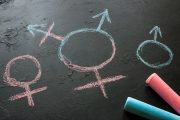
A new study that has just listed the best and worst states for women’s “equality” may again illustrate two truths:
What most call “equality” actually, well, isn’t.
And equality tells you nothing about quality.
Performed by personal finance website WalletHub and supposedly designed to “determine where women receive the most equal treatment,” the site writes, “WalletHub compared the 50 states across 17 key indicators of gender equality. Our data set ranges from the gap between female and male executives to the disparity in unemployment rates for women and men.”
According to the site, the 10 most equal states for women are, listed in order, Nevada, Hawaii, Vermont, Maine, New York, California, Iowa, West Virginia, Michigan, and Massachusetts.
The 10 least equal states are, respectively, Utah, Idaho, Texas, South Carolina, Kansas, Georgia, Alabama, Oklahoma, Virginia, and Louisiana.
Elaborating further on its methodology, WalletHub writes that to “determine where women receive the most equal treatment in the U.S., WalletHub compared the 50 states across three key dimensions: 1) Workplace Environment, 2) Education & Health and 3) Political Empowerment.”
Interestingly, the site does what today is standard procedure: It prioritizes among its criteria what are characteristically male endeavors (e.g., politics) — although the pseudo-elite social engineers will claim there are no such things — which of course guarantees that women will come out seeming “disadvantaged.” It also generally omits areas where women have an “advantage.”
For instance, WalletHub evaluated factors such as “Income Disparity,” “Higher-Income Disparity,” “Disparity in Share of Executive Positions,” “Entrepreneurship-Rate Disparity,” and “Disparity in Share of Lawmakers.”
Yet the site didn’t consider workplace deaths, 92 percent of which involve men because they perform the most dangerous, dirtiest jobs. It also didn’t consider how family courts are biased against men or how they generally receive harsher punishments for the same crimes — or how in every state (because it’s federally imposed) selective service registration is only required of men.
Moreover and almost comically, under “Education & Health” WalletHub considered one and only one exam-oriented metric: “Disparity in Math Test Scores.” Now, it’s fairly well known that girls have long been getting better grades than boys do and attend and graduate from college at higher rates, and that math-test scores are one of the few areas where lads fare better. Why didn’t the study also consider, for example, English and language-arts test scores and other metrics where girls excel? It appears that WalletHub was cherry-picking criteria in order to achieve a predetermined result.
But even that’s wasn’t enough. Note that WalletHub also writes, “In certain states and for certain metrics where women showed an advantage over men, we treated the state as having gender equality.”
Huh?
In other words and as I’ve long said, “equality” is a ruse and almost no one who has thought about it deeply really subscribes to it. (This is why, with the Left’s mask increasingly dropping, often trumpeted now is that euphemism for institutionalized discrimination: “equity.”) So, sure, “All animals are equal, but some animals are more equal than others.”
And why did WalletHub thus spin its “research”? Perhaps because it wanted to avoid the conclusion of a more comprehensive and valid 2019 global study conducted by university researchers. Namely, that men face more discrimination and have it harder in 91 of 134 countries — including the United States.
Yet delving deeper still, 10 of WalletHub’s 17 criteria involve workplace matters — again, traditionally male ones — such as income. Yet saying that “women’s lower earnings and workplace status disadvantage them” reflects a shallow analysis and misses much.
It’s well known that men earn more and generally have higher workplace status because of decisions the sexes, including women, freely make. For example, men tend to enter more lucrative fields (e.g., the hard vs. the soft sciences) and work longer hours, and are more likely to accept promotions involving greater stress and responsibility and to prioritize pay over job satisfaction.
Yet do they generally do this for fun, or is there some other motivation?
For their part, women often prefer staying home part or full time with their children to indulging careerism. This means, of course, that men are far more likely to be their families’ main or sole breadwinner, and here’s what this means:
When these men earn higher incomes, it benefits the women — the wives and daughters — who depend on them.
In other words, social engineers aspiring to eliminate the male-female wage gap are actually trying to advantage single women over married women raising children. (That is, if something encouraging single women not to wed can be said to benefit them.) This certainly doesn’t facilitate family formation.
Lastly, there’s how equality tells you nothing about quality. While it’s only a correlation, four of the six “most equal states for women” — Hawaii, Vermont, New York, and California — also happen to be four of the five least free states according to a Cato Institute study.
Even more tellingly, however, WalletHub complains that in “2021, the U.S. failed to place in the top 10 — or even the top 25 — of the World Economic Forum’s ranking of 156 countries based on gender equality. The U.S. ranked 30th.” Yet ranked seventh by the World Economic Forum, 23 spots ahead of the U.S., is Rwanda, most (in)famous for the 1990s genocide that wiped out approximately three-quarters of its Tutsi minority.
Note that Rwanda’s average household income is $400 a year, and the quality of life indexes I’ve checked don’t even include the nation among ~83 listed countries. This site, however, states that “Rwanda is ranked as an extreme hardship location.”
But, hey, it’s more “equal” than we are, so it’s all good.



